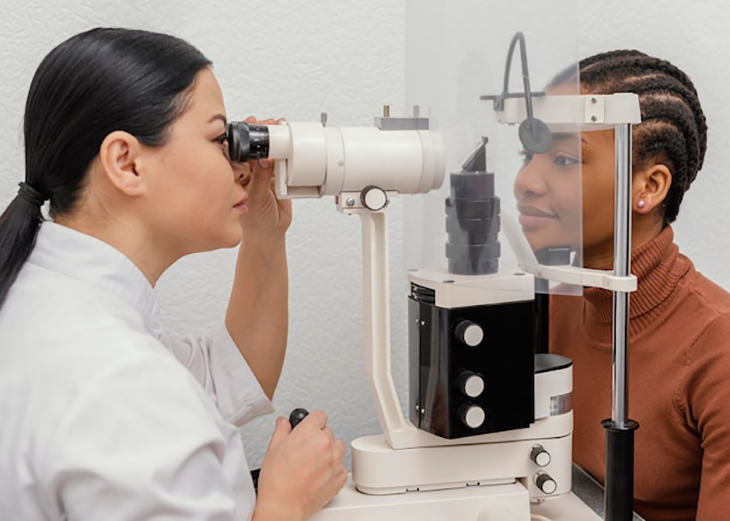
Diabetic eye disease is a group of eye problems that may affect people diagnosed with diabetes. Unfortunately, a new study has also found that despite treating people in the early stages of such diabetes-related diseases, while it may slow down the progression of the conditions, it doesn’t necessarily mean that it will prevent vision loss later on in the future.
Published in JAMA, the study included 328 adults with either type 1 or type 2 diabetes, who also had early-stage eye disease – also known as non-proliferative diabetic retinopathy (NDPR), in at least one of their eyes.
Diabetic retinopathy is a disease that develops in the eye when the blood vessels in the light-sensitive retina end up weak, leaking fluid into the surrounding tissue. When this condition gets worse, there are usually two complications in the retina that occur, which can end up in vision loss. These are proliferative diabetic retinopathy (PDR), which involves the growth of new but abnormal blood vessels, and the other is fluid buildup that’s called diabetic macular edema (DME).
Usually, doctors treat these conditions by injecting anti-vascular endothelial growth factor (anti-VEGF) drugs into their eyes in order to lessen vision loss, however there is still no research that shows a clear picture of when the best time is to begin the injections in order to get the best results. Eye doctors also haven’t bene able to say if starting the treatments sooner rather than later may even prevent vision loss when patients end up developing severe diabetic eye disease if ever.
Is There an Answer To Vision Loss Caused By Diabetic Retinopathy?
In this new study, scientists assigned the patients with early-stage diabetes-related eye disease to get injections with either the anti-VEGF drug called aflibercept (Eylea) or the placebo solution randomly. They also did follow ups for the next four years.
At the end of the study, those that were given the anti-VEGF injections had ‘significantly less structural damage to their eye’ than the other patients that only received the placebo. Moreover, there was an overall disease progression that occurred in 34 percent of the eyes of those treated with anti-VEGF injections as compared to those with 57 percent in the group given the placebo.
However, the researchers also report that the drug didn’t cause ‘any meaningful difference in preventing vision loss.’
Senior study author and associate professor of ophthalmology at Harvard Medical School and the Joslin Diabetes Center in Boston, Jennifer K. Sun, MD, MPH, said, “The results of this study indicate that the anatomic benefit from early anti-VEGF treatment does not result in improved visual acuity, and so it may not be worth the risk and inconvenience to the patient of repeat preventive injections for NPDR,”
“While the individual risk of complications per injection is low, the risk increases with each additional injection,” Dr. Sun adds.
Small but Real Side Effect Risks from Injections for Diabetic Eye Conditions
The most common procedure that ophthalmologists use is to inject anti-VEGF drugs, and it’s also considered the most safe, explains professor of ophthalmology at the Cullen Eye Institute and Baylor College of Medicinein Houston, Christina Y. Weng, MD. However, she also shares that there is a small risk of side effects, like severe inflammation in the eye, retinal detachment, and vision loss. Notably, Dr. Weng was not involved in the study.
She explains, “A small risk of adverse events always exists, and these compound with each injection over time.”
One particular question that still remains unanswered in the new study is if the results that came out using aflibercept in this new study may also apply to two other anti-VEGF drugs, namely bevacizumab (Avastin) and ranibizumab (Lucentis).
Ophthalmologist and associate professor at the University of Nottingham in England, Winfried Amoaku, MBBS, PhD, who also wasn’t involved in the study says, “There’s no evidence that either ranibizumab or bevacizumab, given at a similar regimen, will provide a better outcome.”
Comparable Diabetic Eye Drugs Probably Not Likely To Have Better Results Either
According to Dr. Weng, former research also suggests that anti-VEGF drugs have similar results when they’re used for other conditions, like diabetic macular edema. However, this also suggests that these medicines would have similar results when used to prevent vision loss for those with early stages of diabetic retinopathy.
Dr. Weng also says, “That being said, large-scale clinical trials primarily evaluating the treatment of NPDR have not been conducted with agents other than aflibercept, and thus, it is possible that a different anti-VEGF agent could give rise to different results.”
Although these new study results show that the early treatment with anti-VEGF drugs don’t necessarily make sense, Dr. Sun says that patients still need to talk to their doctors and make decisions based on their personal disease status for each eye, as well as the impact of their eye conditions on their day-to-day lives.
Dr. Sun adds, “There may be a minority of patients in whom early treatment is warranted.”



